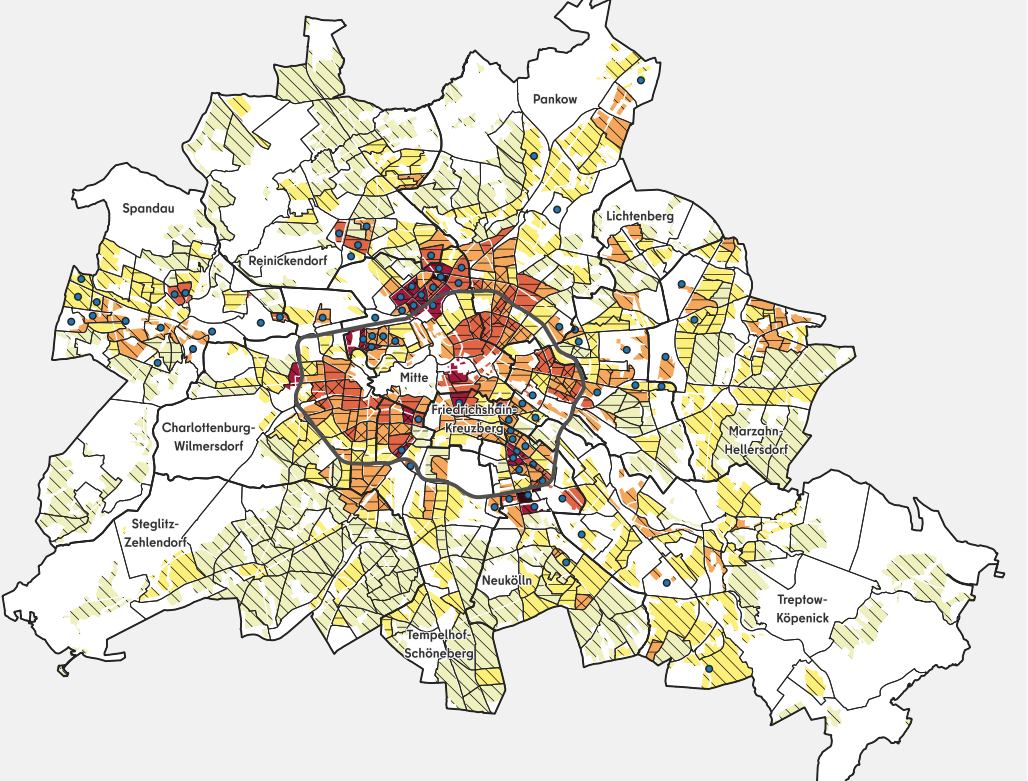Thessaloniki gets ready for its metro launch in November
The underground rapid transit lines have been under construction for almost two decades due to various project delays
 TheMayor.EU logo
TheMayor.EU logo It shows that socially disadvantaged areas tend to suffer from compounding levels of pollution
On Tuesday, authorities in Berlin published an updated version of the city’s climate justice atlas. The atlas takes a look at the spatial distribution of environmental pollutants in the German capital’s territory. The research is supposed to help local lawmakers when crafting green policy by showing areas where it is most needed.
The climate atlas looks at five factors impacting the quality of life – noise pollution, air pollution, bioclimatic (abnormal heat, cold and etc.) load, supply of green spaces and social disadvantage.
These factors have a tendency to compound and feed off each other, which can have a significant negative impact on the health and wellbeing of citizens.
 The darker an area is coloured the more polluting factors it suffers from, Source: City of Berlin
The darker an area is coloured the more polluting factors it suffers from, Source: City of Berlin
The first climate justice atlas in Berlin was developed in 2019 to track the correlations between compounding climate issues. At the same time, it would allow lawmakers to target specific areas with climate mitigation measures.
Simply put, this means that not all neighbourhoods in Berlin are made equal. Some are exposed to large amounts of noise pollution, while the uneven spread of green spaces impacts the day-to-day life of citizens.
According to the atlas, however, the disproportionate effect of pollution is not only limited to Berlin’s inner city, and also affects the outskirts. Furthermore, researchers point out that while densely populated areas do attract more pollution, a bigger factor is the residential districts’ proximity to busy transit routes.
At the same, Senator Bettina Jarasch explained that people with low social status are overwhelmingly exposed to dangerous compounding levels of pollution. This, she says, is due to the fact that quite often they live in densely populated areas with low access to green space and a lot of passing traffic.
She continued by pointing out that the atlas shows that environmental protection is a burning issue from a social justice perspective.

The underground rapid transit lines have been under construction for almost two decades due to various project delays

Now you can get your wine in Talence by paying directly in Bitcoin

That’s because the state has to spend money on updating the railway infrastructure rather than subsidizing the cost of the popular pass

Rethinking renewable energy sources for the urban landscape

The examples, compiled by Beyond Fossil Fuels, can inform and inspire communities and entrepreneurs that still feel trepidation at the prospect of energy transition

Now you can get your wine in Talence by paying directly in Bitcoin

The 10th European Conference on Sustainable Cities and Towns (ESCT) sets the stage for stronger cooperation between the EU, national and local level to fast track Europe's transition to climate neutrality.

At least, that’s the promise made by the mayor of Paris, Anne Hidalgo

The underground rapid transit lines have been under construction for almost two decades due to various project delays

At least, that’s the promise made by the mayor of Paris, Anne Hidalgo

Hostal de Pinós is located in the geographical centre of the autonomous region

Despite its church-y name, the district has long been known as the hangout spot for the artsy crowds

Urban dwellers across the EU are having a say in making their surroundings friendlier to people and the environment.

Forests in the EU can help green the European construction industry and bolster a continent-wide push for architectural improvements.

Apply by 10 November and do your part for the transformation of European public spaces

An interview with the Mayor of a Polish city that seeks to reinvent itself

An interview with the newly elected ICLEI President and Mayor of Malmö

A conversation with the Mayor of Lisbon about the spirit and dimensions of innovation present in the Portuguese capital














